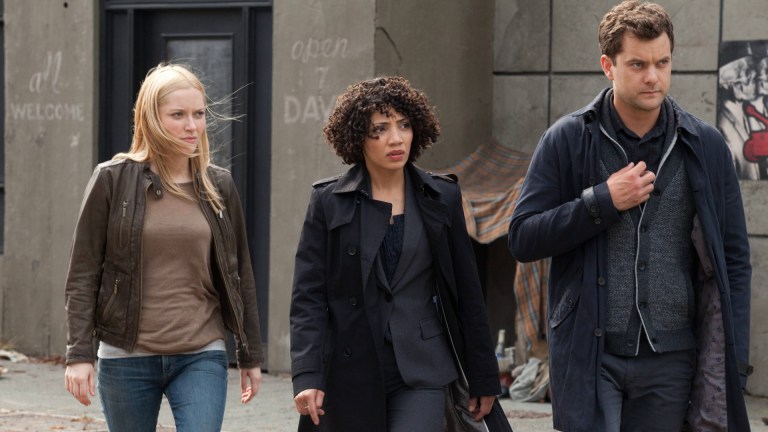Fringe Was a Dark Warning For Our Future
The cult sci-fi show aired its last episodes on Fox over a decade ago, but like all good genre storytelling, Fringe had predictive abilities.

This article contains spoilers for all seasons of Fringe.
Many saw it as the second coming of The X-Files – a fresh retake on a group of agents, scientists, and conspiracy theorists that investigated pseudoscientific cases that normal reasoning could not explain. Fringe was a timely update to the format Fox had perfected in the late ‘90s and early 2000s, and creators J. J. Abrams, Alex Kurtzman, and Roberto Orci, mad-scientists in their own right, arguably brought the original Gen X viewers of X-Files and a new millennial audience together. Not by simply rehashing the same old “monster of the week” episodes, but connecting the outlandish science-fiction elements with realistic human experience.
Fringe followed the casework of the Fringe Division, a Federal Task Force supported within the Federal Bureau of Investigation, which includes Agent Olivia Dunham, (Anna Torv) Dr. Walter Bishop (John Noble), and Walter’s estranged son, Peter (Joshua Jackson). The team are supported by Director Phillip Broyles (in one of the late, great Lance Reddick’s best roles), and Agent Astrid Farnsworth (Jasika Nicole), who assists Walter in his research and experiments.
Like the greats before it such as The Twilight Zone, The Outer Limits, and leaving the door open for great serial subtextual storytelling such as Black Mirror and Love, Death + Robots – Fringe had a brilliant and nimble way of showing aspects of humanity that we may not always want to face. Especially when considering just how much as happened in the previous decade (a decade full of events that many did not see coming), Fringe had an uncanny ability to look at the patterns within society and give some eerie predictions.
The Privatization of Science
The Fringe Division’s work often intersects with advanced technology and biological research that few people in the word can comprehend. Just as often, this leads them to either interrogate or consult a mega-company called Massive Dynamic, founded by Walter’s former partner, Dr. William Bell (the iconic Leonard Nimoy), and run by Walter and William’s common ally, Nina Sharp (Blair Brown). In the show’s five seasons, Massive Dynamic is more anti-hero than hero, as the show creators made them deliberately amoral. They weren’t completely devoid of conscience, but seemed to serve their own agenda, and the agenda of their founder, Bell.
The important aspect of Massive Dynamic was how a global, billion dollar company could so easily control several different aspects of the world, predominantly through scientific innovation and engineering.
Mega companies are nothing new, but mega-tech companies are almost inherently a 21st century staple. When the show was created in 2008, and the years that followed, Apple was massive, but not to the level it is now. Amazon was doing just fine, but if someone were to invest $1000 in Amazon stock in 2008, that stock would now be worth over $36,000.
These companies have grown exponentially, but Big Tech is using the newest technological innovations that could change the world for the better for mere profit. At the forefront of all of these companies as well, is some sort of almost “mythical” figure who seems to be detached from humanity. Mark Zuckerberg and Elon Musk often try to mimic human behavior when on camera, but there is something strange about how disconnected they seem, especially considering that both head mammoth social media platforms.
When the Fringe Division consulted Massive Dynamic, more often than not our heroes found that Bell and Sharoe were serving their own ulterior and secretive purposes. People like Zuckerberg, Musk, and Bezos have built a cult more than a humanitarian business, much like Bell does in Fringe. The writers recognized this strange, specific ego in some, and somehow Bell would fit perfectly in a world where billionaires are racing to get to Mars, simply to invite those who can afford it, rather than saving the planet we have right here, right now.
The Militarization of Science
It has been another sad truth, that if science and tech are privatized, they are militarized. Often it’s both at the same time. Yet one of the strongest storylines of Fringe was the introduction of an alternate, parallel universe, intrinsically linked to the show’s main universe. In that second season, when the creators really latched on to that idea, many consider that to be when the show shed the shackles of The X-Files and became its own entity. With this alternate universe, Abrams, Kurtzman, Orci, and the writing team gave themselves an opportunity to double their storytelling.
This meant that audiences were treated to two Walters, two Olivias and two versions of almost all beloved characters, not to mention some fan-favorites who met their demise in the prime universe got a chance to make a comeback. With one key exception – we never see the Alternate Peter. It’s later revealed that Prime Walter, after losing his Peter, went to the alternate universe and kidnapped that version of his son.
During the last few decades in the timeline of the show, the alternate universe had also been seeing several fissures that open up, tearing at the very fabric of that universe. The result was “Walternate” became a man that was as impenetrable as the amber he used to close off anomalies in his universe. It raised a question that we have often not come across, which is what if America truly became a police state. Walter in the alternate universe was Secretary of State, and arguably the most powerful man on that planet. He built his own business, he gained political power, and he was likely the smartest man in the world.
We’re so accustomed to laughing at the stupidity of politicians, at times we forget that there are many who are very intelligent. Those people might not use privatization to gain what they need. They, like Walternate, will use fear, and come to us as some sort of savior. They will seize power however they can, and most politicians abuse that power through whatever militaristic means they have at their disposal.
Fringe begged the question, what if it is not the former reality show host we have to fear. What if it is the machiavellian genius who uses science and intelligence to gain power?
We’re our Own Worst Enemy
The obvious use of the “dopplegangers” beat another great subtextual writer of sci-fi and horror by about a decade. Jordan Peele’s Us gave filmgoers a look into a literal dark mirror, seeing what it would be like if our own worst enemy was ourselves.
Nevermind Walternate being an unstoppable militaristic force, or “Fauxlivia” – Olivia’s alternate, abducting Prime Olivia and taking her place in the Prime Universe for a time, it was a story thread the writers went back to again and again.
The more subtle version of this was how Walter could not trust almost anything when it came to his own cognition. The show begins as he’s been committed to a mental health institute, and throughout the show, he often forgets important aspects not only about the experiment he’s running, but even the people around him. He cannot trust his own memories, and the entire show’s run is exploring Walter’s character arc as he tries to atone for his past mistakes. Almost as if past Walter was the villain, and modern Walter is a tragic hero.
However, in science fiction, you never have to be subtle. That’s half of the enjoyment of well-written subtextual sci-fi.
The writers of Fringe very early in the show introduced The Observers, a group of pale, hairless and stoic figures who loved fedoras, spicy food and keeping tabs on the Fringe team and their path in life. It was later revealed that The Observers are humans from a possible future. Now in our timeline, they have their own selfish and nefarious purposes to keep us on a predetermined path so that their society can thrive and survive.
Apparently we cannot even trust the more advanced version of ourselves.
Technology Will Lead to Dehumanization
The Observers were also an interesting view into a dark future, as they showed us one possibility if we succumb to a technocracy and truly lose our humanity.
As the human condition proved to be standing in the way for human development, The Observers began to genetically remove what they felt were superfluous emotional and metaphysical aspects. Coupled with their advanced technology, human connection was a thing of the past. Emotions such as empathy, compromise and even love were extinct.
If the writers of the show had made that take place as a result of a years-long pandemic, it would have been almost eerily perfect.
If the last few years have proved anything, it’s how a drift between human connection coupled only by predominantly digital interaction has caused delays in human development. In Western society, we trust each other less than ever before. School children are having an extremely hard time getting back into the routine of day-to-day school lessons. There is a dangerous slope that we can easily slide down if technology controls our life.
Fringe also showed this in another antagonist group of super-soldiers, in the Shapeshifters. The Shapeshifters – inorganic human-cyber organisms were created to pervade the Prime Universe and complete the legwork for an eventual full-scale invasion. The Alternate Universe deployed the Shapeshifters to ensure that it was their universe that survived. Both The Shapeshifters and The Observers were human-like creatures that were coupled with tech so intrinsically, that they lost their humanity. A clear warning to what our future might look like.
With Growth, Comes Pitfalls
One of the best aspects of the show, however, was that it was not bereft of hope. Even with their warnings, there was often a thread of “It’s always darkest before the dawn.” Almost all of the aforementioned story beats from the show were terrifying or disturbing in their own way, but it all led to one thing – progress.
The Observers were a necessary evil. The most notable Observer, the Fringe Division’s ally, September (Michael Cerveris) went through a massive change over decades within the show’s timeline to regain his humanity and become a father. Experiments that were conducted on Olivia as a child became her strength, easily mirroring the mistrust some have for government officials and mandated vaccines. In the end, it made her stronger, as it was in fact, progress. The two universes in season 4 even begin working together to ensure the survival of both universes, and the betterment of all humanity… times two. Fringe shows us that we may not always trust science. We may not always trust new technology, or want to deal with it. We may not even trust each other. It is a show that teaches us that if we lose that connection, if we forget about love and forgiveness, therewithin is where the real darkest timeline lies.
All seasons of Fringe are available to stream on HBO Max and Freevee in the U.S. and Sky Go and NOW in the U.K.
